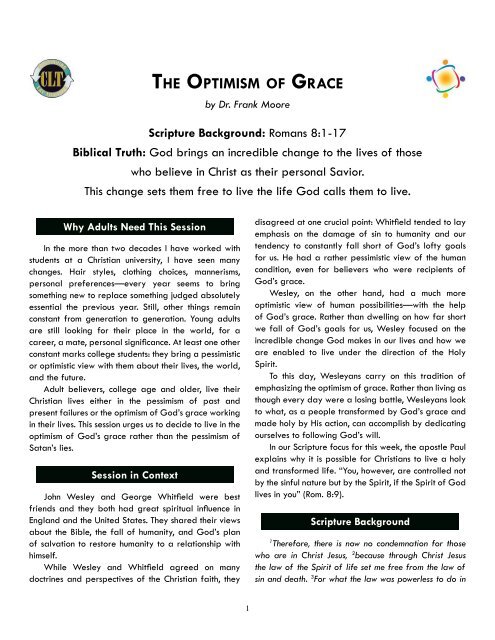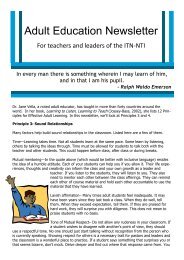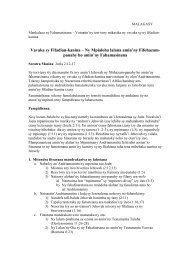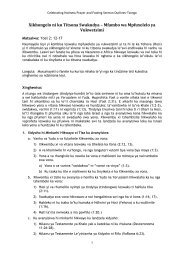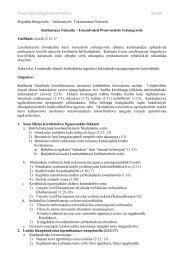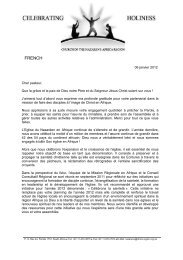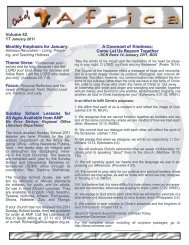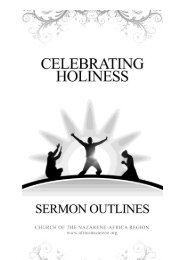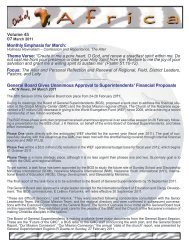THE OPTIMISM OF GRACE
THE OPTIMISM OF GRACE
THE OPTIMISM OF GRACE
Create successful ePaper yourself
Turn your PDF publications into a flip-book with our unique Google optimized e-Paper software.
<strong>THE</strong> <strong>OPTIMISM</strong> <strong>OF</strong> <strong>GRACE</strong>by Dr. Frank MooreScripture Background: Romans 8:1-17Biblical Truth: God brings an incredible change to the lives of thosewho believe in Christ as their personal Savior.This change sets them free to live the life God calls them to live.Why Adults Need This SessionIn the more than two decades I have worked withstudents at a Christian university, I have seen manychanges. Hair styles, clothing choices, mannerisms,personal preferences—every year seems to bringsomething new to replace something judged absolutelyessential the previous year. Still, other things remainconstant from generation to generation. Young adultsare still looking for their place in the world, for acareer, a mate, personal signifi cance. At least one otherconstant marks college students: they bring a pessimisticor optimistic view with them about their lives, the world,and the future.Adult believers, college age and older, live theirChristian lives either in the pessimism of past andpresent failures or the optimism of God’s grace workingin their lives. This session urges us to decide to live in theoptimism of God’s grace rather than the pessimism ofSatan’s lies.Session in ContextJohn Wesley and George Whitfi eld were bestfriends and they both had great spiritual infl uence inEngland and the United States. They shared their viewsabout the Bible, the fall of humanity, and God’s planof salvation to restore humanity to a relationship withhimself.While Wesley and Whitfi eld agreed on manydoctrines and perspectives of the Christian faith, theydisagreed at one crucial point: Whitfi eld tended to layemphasis on the damage of sin to humanity and ourtendency to constantly fall short of God’s lofty goalsfor us. He had a rather pessimistic view of the humancondition, even for believers who were recipients ofGod’s grace.Wesley, on the other hand, had a much moreoptimistic view of human possibilities—with the helpof God’s grace. Rather than dwelling on how far shortwe fall of God’s goals for us, Wesley focused on theincredible change God makes in our lives and how weare enabled to live under the direction of the HolySpirit.To this day, Wesleyans carry on this tradition ofemphasizing the optimism of grace. Rather than living asthough every day were a losing battle, Wesleyans lookto what, as a people transformed by God’s grace andmade holy by His action, can accomplish by dedicatingourselves to following God’s will.In our Scripture focus for this week, the apostle Paulexplains why it is possible for Christians to live a holyand transformed life. “You, however, are controlled notby the sinful nature but by the Spirit, if the Spirit of Godlives in you” (Rom. 8:9).Scripture Background1Therefore, there is now no condemnation for thosewho are in Christ Jesus, 2 because through Christ Jesusthe law of the Spirit of life set me free from the law ofsin and death. 3 For what the law was powerless to do in1
that it was weakened by the sinful nature, God did bysending his own Son in the likeness of sinful man to be asin offering. And so he condemned sin in sinful man, 4 inorder that the righteous requirements of the law mightbe fully met in us, who do not live according to the sinfulnature but according to the Spirit.5Those who live according to the sinful nature havetheir minds set on what that nature desires; but those wholive in accordance with the Spirit have their minds set onwhat the Spirit desires. 6 The mind of sinful man is death,but the mind controlled by the Spirit is life and peace;7the sinful mind is hostile to God. It does not submit toGod’s law, nor can it do so. 8 Those controlled by the sinfulnature cannot please God.9You, however, are controlled not by the sinful naturebut by the Spirit, if the Spirit of God lives in you. Andif anyone does not have the Spirit of Christ, he does notbelong to Christ. 10 But if Christ is in you, your body isdead because of sin, yet your spirit is alive because ofrighteousness. 11 And if the Spirit of him who raised Jesusfrom the dead is living in you, he who raised Christ fromthe dead will also give life to your mortal bodies throughhis Spirit, who lives in you. 12 Therefore, brothers, we havean obligation—but it is not to the sinful nature, to liveaccording to it. 13 For if you live according to the sinfulnature, you will die; but if by the Spirit you put to deaththe misdeeds of the body, you will live, 14 because thosewho are led by the Spirit of God are sons of God. 15 Foryou did not receive a spirit that makes you a slave againto fear, but you received the Spirit of sonship. And byhim we cry, “Abba, Father.” 16 The Spirit himself testifi eswith our spirit that we are God’s children. 17 Now if weare children, then we are heirs—heirs of God and coheirswith Christ, if indeed we share in his sufferings inorder that we may also share in his glory. Romans 8:1-17(NIV)Scripture ExpositionIntroductionOne of my favorite human interest photographsappeared on the front page of our newspaper afew years ago at Christmas. The photo showed a setof identically-dressed twin boys sitting on Santa’sknees. One boy had a big smile on his face in eageranticipation of what this jolly old man was going togive him; the other was crying in fear. What a contrast!Same situation—different reactions.This session reminds us of a similar difference ofperspective in the Christian community with regard toGod’s plan of salvation for humanity. What attitudeshould characterize the lives of believers? Should acloud of doubt and failure follow them everywhere theygo, reminding them of their shortcomings, weaknesses,and sins? Or, should a song of “Victory in Jesus” fl owfrom their mouths as they live the Spirit-fi lled life? It’s alla matter of perspective. Are you a spiritual optimist ora spiritual pessimist?As we study this passage of Scripture, pay particularattention to the contrasts Paul makes between our oldway of life prior to coming to Christ and our new wayof life in Him. Sadly, many Christians continue to livein the mindset of bondage to their old life of sin, evenafter they trust Christ for their salvation. They think aslong as we occupy this human body and live in a fallenworld, we are doomed to endless failure. Paul remindsus that our condemnation has passed, “because throughChrist Jesus the law of the Spirit of life set me free fromthe law of sin and death” (Rom. 8:2). Through Christ weare able to live in optimistic victory!The Two Ways (8:1-9)The key to understanding today’s passage liesin verse 1: “Therefore, there is now no condemnationfor those who are in Christ Jesus” (emphasis added).“Therefore” in this verse refers back to the condemnationof the Law explored in Romans 7. Christ took our placeon the Cross; therefore, He freed us from sin. We don’tneed to wait for death to bring deliverance from thebondage of sin. That deliverance is ours now as wewalk in the Spirit. This incredible freedom of whichPaul speaks requires only that we make a choice tolive in Christ Jesus. But what does “living in Christ Jesus”mean?Romans 8:2-9 clearly differentiates between life inthe fl esh and life in the Spirit of Christ. Paul refers tothe fl esh more than 12 times and the Spirit 16 times inRomans 8. There are two alternative ways of thinking,valuing, and living. First, is life according to the fl esh2
(the way we were before coming to Christ); second islife according to the Spirit (the way God urges us to livenow). The fi rst way sees God as a God of judgment; thesecond way shows Him as the God of persistent grace.Let’s compare and contrast these two alternative viewsin the contrasting pairs given below.Two preferences (8:1, 8-9)“In Christ Jesus.” We are in Christ; He is in us. TheSpirit brings the living presence of Christ not just to usbut in us. We are united with Him in a mystical connectionthat makes possible daily communion between our spiritand His Spirit. Our spirit is not absorbed by His so as tonullify our personhood or cancel our free will. Thus, westill make our own choices and think our own thoughtsbut with the advantage we receive advice and intimatecouncil from Him through the Spirit.“In the fl esh.” The Bible uses fl esh in three main ways:(1) our physical bodies, (2) the human point of view, and(3) our selfi sh nature. Paul intends the third way in thispassage of Scripture. In this sense, the fl esh representsa mindset, in which we make no attempt to choose Godover our own desires. We do what we want, when wewant, and in the manner we want. We seek our ownhappiness over all other priorities.Two walks (8:1, 4-5, 9)“Spiritual walk.” A spiritual walk keeps us in stepwith God. Our own self-preferences are put aside aswe choose to do God’s will over our own. Often, thispath runs counter to what we might choose for ourselves,but we want God’s will so much we will endure personaldiscomfort and uncertainty for His presence and plan.“Fleshly walk.” This walk keeps us in step with our owndesires. Selfi shness, self-seeking, and self-gratifi cationmark the path for this walk. Sometimes, this path runscounter to the feelings and well-being of others, but nomatter; self gratifi cation is the target. While we maynot intend to disregard God’s ways, we do not allowHis ways to lead us away from our perspective anddesires.Two laws (8:2)“The law of the Spirit of life.” This law comes notfrom a rule book or a court bench but it comes fromthe heart of God. This law guides our thinking, feelings,actions, and attitudes. It’s not so much a list of rules asthe safety zone for our relationship with God. This loverelationship with God causes us to long for His ways, astaught to us by His Spirit.“The law of death.” This law comes from the evilone. It tells us to do as we please. It’s a law that callsfor us to disregard all other laws and loyalties. Thinkwhat you want to think. Do what you want to do. Makeyourself happy. The problem with this law? It leadsstraight to destruction and death.Two powers (8:3-4)“The power of Christ.” Christ became ourrepresentative on the Cross. By His sacrifi ce, we nowhave full remission for our sins. The result is amazing. ToGod, we are fully and completely forgiven. There’s a bigdifference between God forgiving us but rememberingour sins and God forgiving and forgetting our sins. Hedoes the latter. Christ’s power gives us a new hearttoward God and a new start with Him. Amazing power!Amazing grace!“The power of the Law.” The law tells us we mustfollow every regulation with exacting precision in orderto please God. However, that leads to frustration andfailure. And when we fail or fall short, the law condemnsus. It offers no power to succeed or hope that we canever meet its demands. Like a taskmaster who cannotbe pleased, the law tells us we’re wrong but offers nohelp for correcting our way.Two loyalties (8:5)“Loyalty to the Spirit.” This loyalty lovingly directsus to God’s will. Our preference is to please God. Ourpersonal desires fall subject to God’s holy, pure, andloving desires for us. It’s not that we long to do one thingbut force ourselves to do something else. It’s that ourdesires become at one with His. Our pleasure is to doHis pleasure.“Loyalty to the fl esh.” This loyalty subjects us tothe powerful whims of our desires, our addictions, andour shortsighted passions. We become obsessed byeverything that looks good to us. We are obsessedbecause we think they are best for us. We have no otheropposing point of reference so we enter into the fl ow3
of the obsession. Loyalty to the fl esh defies wisdom. Itneeds no other argument than “because it seems goodand I want to.”Two destinies (8:6-7)“Life.” It’s quite ironic. Jesus said to save your life,you must lose it (Matt. 16:25). So, when you surrendereverything—your will, your preferences, your desires,your hopes, your dreams, your plans—when yousurrender body, soul, mind, and spirit to God’s Spirit,rather than losing your life, you actually gain life to thefullest. We need not wait for the end of our journey onearth to start to enjoy eternal life. Life lived in the Spiritgives us the joys and benefi ts of eternal life right now.“Death.” This path ends in total destruction. Thefi nal stage of addiction brings total bondage. The fi nalstage of self-seeking brings total selfi shness. The fi nalstage of the life of the fl esh brings physical, spiritual,psychological, and emotional death.Glorious Benefits (8:10-17)We have just seen how Paul has contrasted twoways of living. One path leads to life in the Spirit; theother leads to death. The choice seems simple, but incase we aren’t persuaded, Paul now moves on to theglorious benefi ts of choosing life in the Spirit. Notethese benefi ts:• The Spirit of Christ dwelling in our hearts (v. 10)• Physical resurrection from the dead (v. 11)• Adoption into the family of God (vv. 14-15)• The witness of God’s Spirit to our spirit (v. 16)• Joint heirs with Christ (v. 17a)• Glorifi cation in heaven (v. 17b)Words fail to properly describe the incrediblereward awaiting those who decide to live on God’sterms—life in the Spirit of Christ. We validate ourconsecration and affi rm our sanctifi cation daily as wecontinue in the optimism of His grace to live out ourresolve to make Christ Lord of all!ConclusionThis session reminds us of the incredible benefi ts weenjoy as children of God. Paul urges us to live eachday in step with the Spirit of God. We must not continueto live in bondage to our old life of sin. We can bepessimistic about how less-than-perfect our lives arein this fallen world and about how many mistakes wemake in our bodies. Or, we can be optimistic about theincredible resources of God’s grace that work within us.The choice is ours. Live with optimism!Further Reflection• Which benefi ts of life in the Spirit do you mostappreciate right now in your life?• Which future benefi ts of life in the Spirit do youmost anticipate?• Given such a clear-cut distinction between thepessimism of the old life of sin and the optimismof life in the Spirit, why would any Christian notchoose to be optimistic about the future?Session Navigator1. Engage InterestBegin by comparing the two ministers, John Wesleyand George Whitfield, mentioned in the section entitledSession in Context. Note they were both believers in Christ;both were ministers of the gospel; both believed in thebasic beliefs of the Christian faith; both preached to largecrowds; both led many people to Christ, and so on.Now, note the big difference in their ministries.George Whitfield emphasized the damage of sin andthe tendency to fall short of God’s plan for our lives. JohnWesley emphasized the indwelling presence of the HolySpirit in our lives, and the power He gives us in order thatwe might have victory over sin. While both men wereeffective evangelists, John Wesley helped turn Englandback from the brink of social collapse because of hisbelief God could make a difference in society. Explorethese two men’s perspectives and discuss the reasons eachone might have chosen their emphasis in ministry. Whichemphasis do you believe is more reasonable, given themessage of scripture, and why?2. Explore the WordThe Bible is full of stories that tell of great reversals.God turns the destruction of sin and a fl ood to a new4
eginning. God turns slaves into a great nation. Awidow, without hope and resources, out of loyalty andlove leaves home to care for her aging mother-in-law.She will become the grandparent of a King. The storiesare too numerous to mention here. Each story had itsdistracters; those who lacked faith anything good wouldcome out of the circumstances. Like Job’s comforters,they preach only doom. But the God of the Bible is aGod of redemption, restoration, and hope.Ask participants to share biblical accounts wherepeople have endured signifi cant setbacks and thenGod has redeemed the situation. List as many as youcan before moving on. Then ask your adults to recallif in any of the situations there were those who werepessimistic about the situation, not believing God wouldintervene. List as many of those people, or groups ofpeople as possible.Now, apply this same process to recent or presentissues. Encourage everyone to share ways in which twoChristians might perceive the same situation differently.Refl ect on both minor incidents (bumper to bumpertraffi c, an angry co-worker, a struggling child) andmajor incidents (loss of a job, death of a loved one, abad investment). How might two Christians see God’sinvolvement in the same situation differently? In youropinion, what does it take to move from a pessimisticview of the situation to an optimistic view?Two WaysDescribe each of the contrasting pairs Paul offers inRomans 8 and invite participants to discuss the questionsabout each pair.• Two preferences: “in Christ Jesus” or “in the fl esh”(8:1, 8-9)‣ What is the appeal of living according to ourown desires rather than to Christ’s desires forus?‣ What are the advantages of choosing Christ’sways over our own?• Two walks: “spiritual walk” or “fl eshly walk” (8:1,4-5; 9)‣ How would you describe the lifestyle of aperson who chooses a fl eshly walk?‣ How would you describe the lifestyle of aperson who chooses a spiritual walk?• Two laws: “the law of the Spirit of life” or “the lawof death” (8:2)‣ What are the biggest differences betweenthese two laws?‣ Why is the law of the Spirit of life not really alaw as we normally think of the concept?• Two powers: “the power of Christ” or “the power ofthe Law” (8:3-4)‣ If the Law cannot help us to achieve God’s goalfor our lives, what purpose does it serve?‣ What is God’s goal for our lives? (a closepersonal relationship and partnership withHim)‣ How does the power of Christ help us reachGod’s goal for our lives?• Two loyalties: “loyalty to the Spirit” or “loyalty tothe fl esh” (8:5)‣ How does loyalty to the fl esh manifest itself indaily life?‣ How does loyalty to the Spirit manifest itself inthe life of a believer?• Two destinies: “life” or “death” (8:6-7)‣ Why would anyone choose to live a way of lifethat ends in fi nal destruction?‣ Explain the irony of Jesus’ observation that tosave our lives, we must lose them.Glorious Benefi tsNot only does life in the Spirit remove thecondemnation of our old way of life before we knewChrist, but it also provides us with many benefits.Ask participants to comment on the incredibleblessing of:• The Spirit of Christ dwelling within• Physical resurrection from the dead• Adoption into the family of God• God’s Spirit witnessing to our spirit• Joint heirs with Christ• Glorifi cation in heaven5


